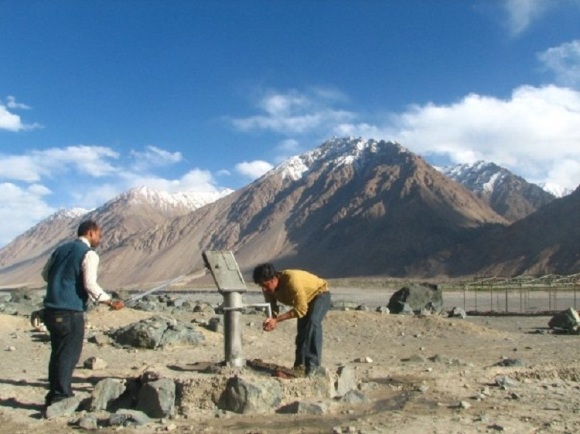Six voices shout in unison with those of our driver and his friend as we cross the mighty Chang-La on the way to Leh. Our driver and now friend, Namgyal Tibetan, as he insists we call him, tells us that everyone who crosses the several passes in Ladakh chants this.

Ladakh means “the land of passes”. Namgyal, who perhaps has the most impeccably managed car in the mountains, tells us the meaning of the phrase, which I now only bleakly remember (and with a bit of help from Google) to be somewhere close to “Victory to the Gods”. The stereo of the car plays songs sung by Namgyal’s Tibetan friends who have been long enough in India to be in the army and get posted at the LoC (Line-of-control). As a male voice sings ‘LoC pe baithe hum yahaa… (Here we sit at the LoC)’, we wind our way back from Sumdho, where we had stayed back last night at a school for nomadic Tibetan kids, while visiting the twin lakes of Tso Kar and Tso Moriri, during the weekend.

And I say weekend, because it wasn’t a vacation. It was a six week internship, with Ladakh Ecological Development Group, that brought us to this fabled land. LEDeG, as it is called, is an NGO working for and in Ladakh and seems to have been around for donkeys years. It is only a testimony to the extensive development work done by the organization that almost everyone in Leh and the surrounding villages knows them by the name of ‘Ecology’.
We started our stint with a brief introduction to everyone at the small but spacious office at Karzoo in Leh. For the next few weeks we were going to work with the very same people and gather some key information for them. These would form the basis for an informed case study of the development work done by the NGO over the past several years, or even decades. We were about to realize, volunteering doesn’t always have to be about building houses with spades and shovels or clearing crops. In our case, the NGO wanted resources that could help with more managerial inputs and devote time to a case study for them. It is here that for so many of us, who have studied at technical and management institutes, the opportunity lies, to give back to our society.

Over the next few weeks, with great help from the NGO, we extensively visited the remotest of villages within Ladakh; from Leh to Kargil and the valleys that lay in between and beyond, of Suru and Sham, of Shyok and Nubra. The key challenge with an arid land like Ladakh lies in the seasonality of agriculture and irrigation. For more than half of the year, the land remains covered with snow. Realising this, LEDeG has over the past several years, invested in developing alternative sources of energy, irrigation and water distribution across Ladakh.
And, we had set to gauge (and if possible, measure) the impact of these interventions. We met several families. In some places, the interventions had massively helped farmers to the extent that they could now buy multiple cars and in others, only modestly. We met farmers who loved the machines provided by LEDeG, and those whose cattle, houses, and trees (and hence wood that is a crucial commodity here) could all in some way be linked, even if indirectly, to the aid and support provided by our NGO. We surveyed them, chatted with them, ate with them and stayed with them in their homes.
There were the other experiences, which were difficult to measure in counts of cattle and houses. Like the moment when we met the residents of a village which had ended up being in a different nation at the end of one of the Indo-Pak wars. Borders mean little here. If you ask them, “Which nation do you prefer?”, they don’t have an answer. But then, if we had been the ones facing the brunt of enemy shells in three different wars, would we be left with any answers?
But most probably, you’ll come back with much more, with the understanding of how people in a far off land, with little access to even electricity, leave aside cinema, live their lives with such grace and contentment. How, in spite of gathering their own wood and walking miles to collect water each time they want to wash their clothes, they don’t complain and how money is just a small part in a community that somehow just knows how to greet every visitor with a smile, whatever the difficulties.

The Happiest People
Lots to learn? Yes. Visit them once. More than anything else, you’ll come back with the experience of a life time.
————————————————————————————————————-
This article was originally published with The Alternative








